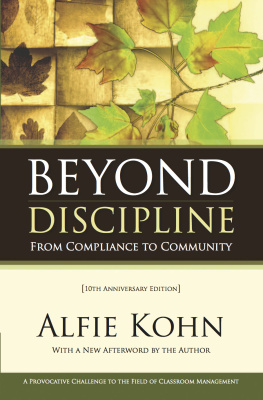

Educators Respond to
BEYOND DISCIPLINE
"After teacher candidates in my class read the first few chapters, they are always mad: `Who does that Kohn guy think he is?' After the next couple of chapters: `Oh, maybe that Kohn guy knows something.' After they finish the book, they're on the bandwagon and committed to creating communities in their classrooms."
-Linda V. Neiman, Milwaukee, WI
"I'm one of those consultants you refer to who, until reading your book, traveled around spreading the gospel of compliance at the expense of genuine community. Beyond Discipline has helped me to reflect deeply upon the practices I've espoused and to recognize their shortcomings. Although I think of myself as someone who embraces a constructivist approach to learning, I've never reflected on its application to becoming a responsible and self-disciplined person. The connection is so obvious, so simple and at the same time so elegant and powerful."
-Ron Rubin, Middlebury, VT
"Beyond Discipline has been and continues to be one of the most important books to me and to the faculty. The philosophy articulated in the book has transformed the entire culture of our junior high school."
-Charles Glassman, New York, NY
"Your book has shown me a better, more humane and more productive method of classroom management-a democratic model based on mutual respect-one that allows kids a significant voice in defining their classroom community, and even elements of the curriculum. It allows me to spend more time on instruction and less on managing behavioral issues. More importantly, it addresses one of the fundamental reasons schools exist-to raise good, kind people."
-Kiernan H. Butz, Germantown, WI
"Unlike most `classroom management' texts, your text requires students to explore their own beliefs about the nature of human beings and the nature of relationships between adults and youth, and thus addresses a much deeper and more significant level of professional development. Your text has been instrumental in helping teacher-trainees come to grips with their own beliefs before they develop classroom management plans. As a result, I think they are more rational practitioners. On a personal note, it has had a major impact on the way I parent my two young children. "
-Wallace K. Pond, Chicago, IL
Also by
ALFIE KOHN
No Contest: The Case Against Competition
The Brighter Side of Human Nature: Altruism and Empathy in Everyday Life
You Know What They Say ...: The Truth About Popular Beliefs
Punished by Rewards: The Trouble with Gold Stars, Incentive Plans, A's, Praise, and Other Bribes
Education, Inc.: Turning Learning into a Business [editor]
What to Look For in a Classroom ... And Other Essays
The Schools Our Children Deserve: Moving Beyond Traditional Classrooms and "Tougher Standards"
The Case Against Standardized Testing: Raising the Scores, Ruining the Schools
What Does It Mean to Be Well Educated?.' And More Essays on Standards, Grading, and Other Follies
Unconditional Parenting: Moving from Rewards and Punishments to Love and Reason
The Homework Myth: Why Our Kids Get Too Much of a Bad Thing




For my daughter Abigail
The chief source of the `problem of discipline" in schools is that ... a premium is put on physical quietude; on silence, on rigid uniformity of posture and movement; upon a machine-like simulation of the attitudes of intelligent interest. The teachers' business is to hold the pupils up to these requirements and to punish the inevitable deviations which occur.
JOHN DEWEY
DEMOCRACY AND EDUCATION
BEYOND
DISCIPLINE
FROM COMPLIANCE TO COMMUNITY
INTRODUCTION
A few years ago, I decided to start observing extraordinary classrooms. Whenever I was traveling and found myself with some extra time, I tracked down teachers in that area who were rumored to be doing interesting things and asked. if I could visit them at work. I was particularly keen to see how they dealt with discipline problems. My assumption was that I could learn more from seeing how talented practitioners responded to obnoxious behavior than I could from reading books on the subject.
As it turned out, I rarely got the chance to see these teachers work their magic with misbehaving children because it seemed as though the children in their classes almost never misbehaved.. Evidently I just happened to show up on unusually harmonious daysor else I wasn't staying long enough. After a while, however, it dawned. on me that this pattern couldn't be explained just by my timing. These classrooms were characterized by a chronic absence of problems.
Even in schools where students are sent to the office to be disciplined, principals know that some teachers almost never need to do this. But why? Obviously there is something to the luck of the draw: the feel of a class, the characteristics of a given group of students and the way they interact, will vary from year to year. But how likely is it that certain teachers just happen to get dream classes every September?
Clearly, we need. to look at the teachers themselves, not just at the kids who are assigned to them. These teachers seem to be doing something that makes it less likely that their students would want to, or need to, act in disturbing ways. During my visits, I've been struck not only by what such teachers are doing, and how successful it is, but by what they are not doing.
They are not concentrating on being effective disciplinarians.
This is partly because they have better things to do, and those better things are preventing problems from developing in the first place. But it's also because discipline-at least as that word is typically used-actively interferes with what they are trying to accomplish. It took me a while to figure that out and to be able to explain why I believe it's true. That's what I attempt to do in this book, and the result is likely to be not merely controversial but deeply unsettling to many readers. What other books have been doing to the old Listen-to-me-lecture, Memorize-these-facts, Fill-in-the-blanks, Keepyour-eyes-on-your-own-paper style of academic learning, this book tries to do to the field of classroom management. (Ironically, a lot of people who offer well-reasoned critiques of traditional academic learning take for granted a bundle of premises about the nonacademic side of what goes on in schools.)



























